How to Manage Parent Burnout While Supporting ABA Therapy at Home
Balancing ABA Support and Self-Care for Parents: A Guide

Recognizing and Addressing Parental Burnout in ABA Therapy
Parenting a child who requires Applied Behavior Analysis (ABA) therapy can be deeply fulfilling but also incredibly challenging. As parents strive to support their child’s developmental needs, they often encounter overwhelming stress and potential burnout. Recognizing the symptoms of parental burnout and employing strategies to manage and prevent it are crucial for maintaining a healthy family dynamic and ensuring effective support for the child.
Understanding Parental Burnout and Its Symptoms
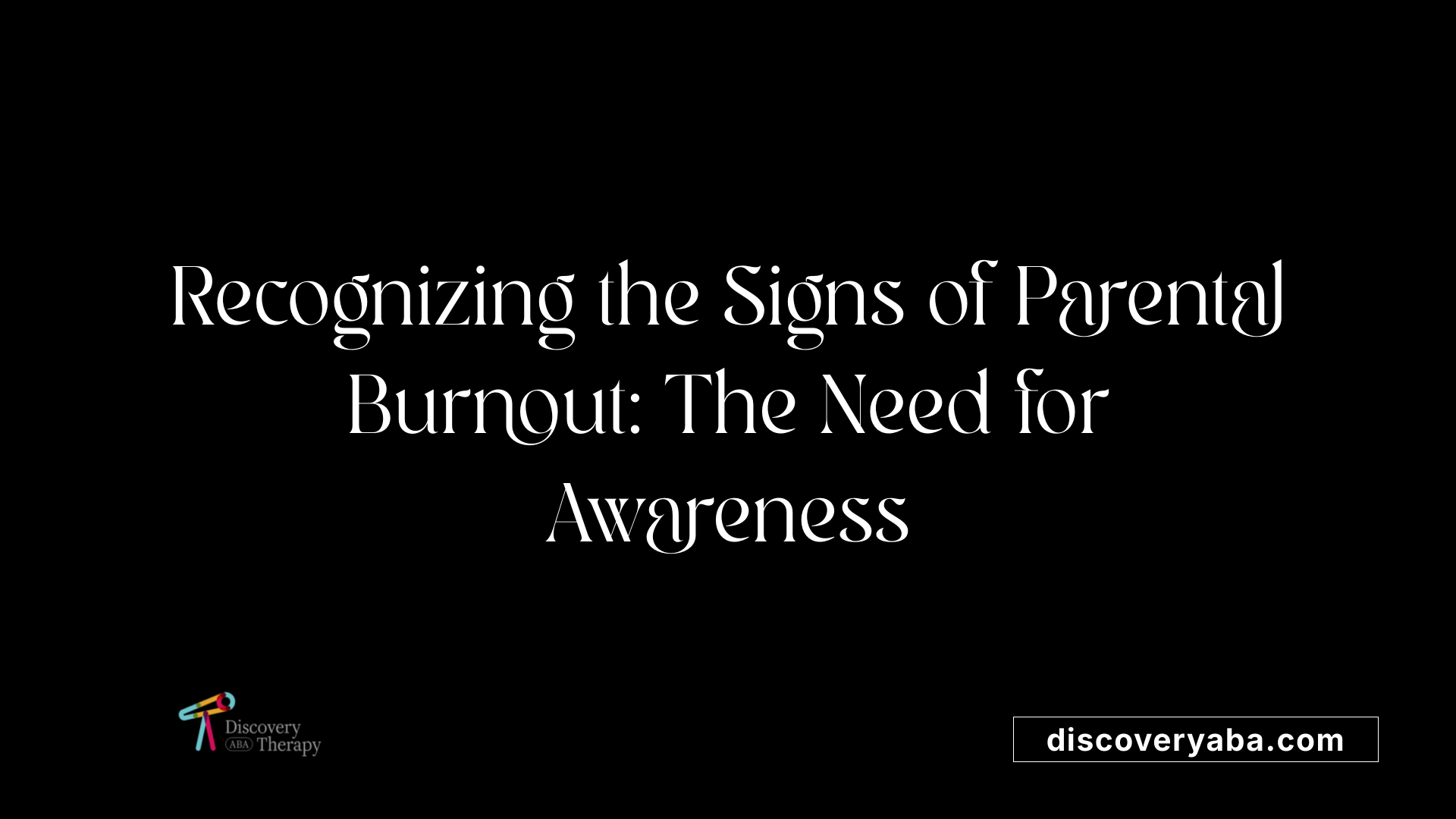
Definition of parental burnout
Parental burnout is a state of physical, emotional, and mental exhaustion experienced by parents due to chronic demands of caregiving. This exhaustion often manifests from the relentless nature of parenting, especially when caring for children who may have special needs or behavioral challenges. It reflects an ongoing feeling of being overwhelmed, resulting in diminished capacity to cope effectively with parental duties.
What are the symptoms of parental burnout?
Symptoms of parental burnout are multifaceted. Parents may find themselves experiencing:
- Emotional Exhaustion: A profound sense of fatigue that goes beyond typical tiredness.
- Emotional Distancing: Parents may feel detached or disconnected from their children, struggling to engage fully.
- Ineffectiveness: A sense of failure or inadequacy in fulfilling parental roles, leading to increased frustration.
- Physical Signs: Symptoms may include headaches, sleep disturbances, and persistent fatigue.
- Cognitive Issues: Problems with concentration, memory, and decision-making, often described as brain fog.
- Behavioral Changes: Increased irritability and a tendency to withdraw from social interactions.
These symptoms can significantly affect a parent's mental health and overall well-being, also impacting their relationships with children and potentially leading to developmental issues.
Consequences on family dynamics
Parental burnout doesn't only affect the individual; it reverberates throughout the family unit. Children may sense their parents' emotional withdrawal, which can alter attachment dynamics and emotional development. Strained relationships can lead to increased conflict and less effective parenting strategies.
In summary, recognizing and addressing parental burnout is crucial. By being aware of the symptoms and understanding its implications, parents can take proactive steps towards recovery, such as seeking support and prioritizing self-care.
Causes and Risks of Parental Burnout
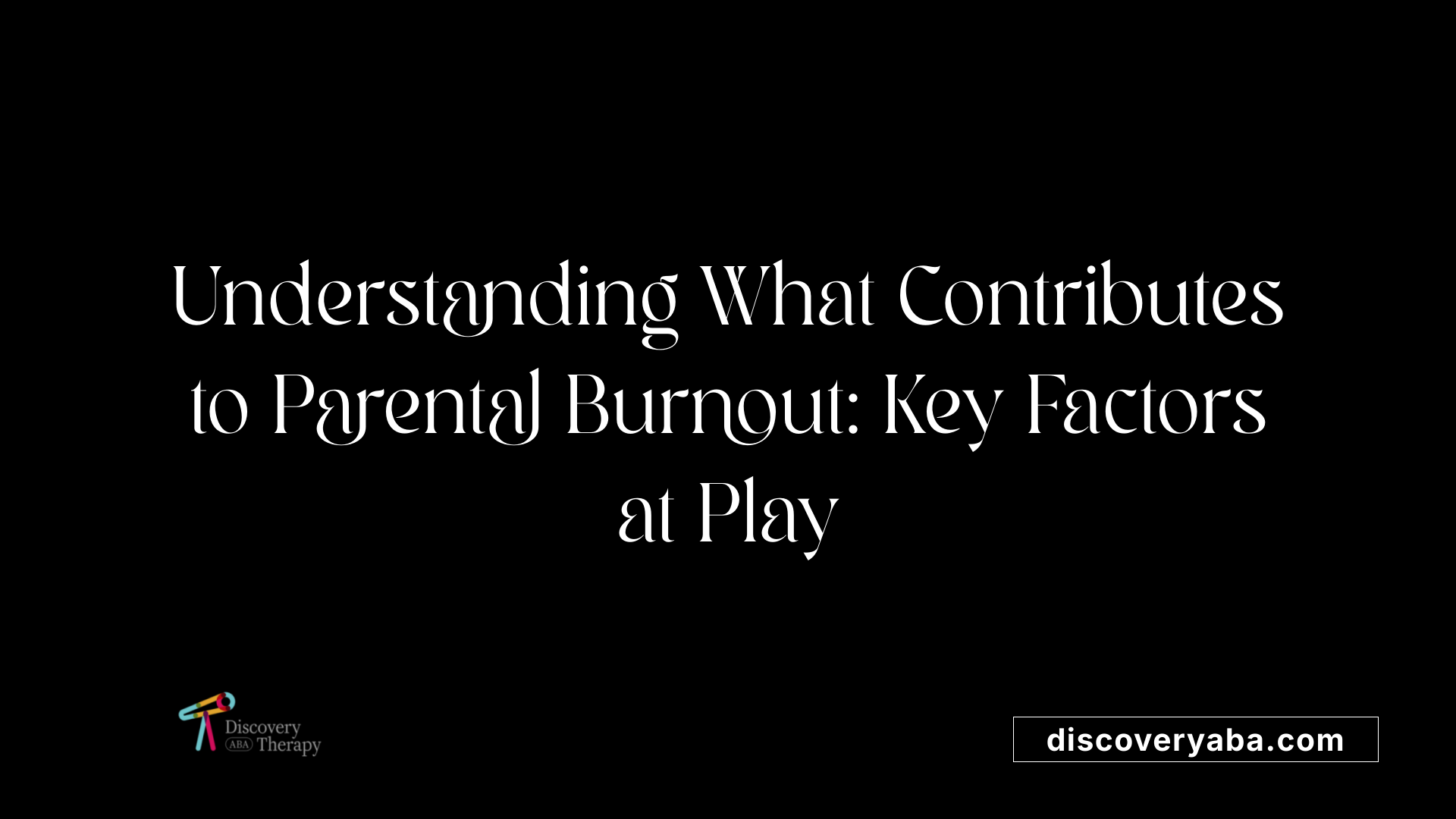
What causes parental burnout?
Parental burnout stems from chronic stress associated with the ongoing demands of parenting. Key contributing factors include:
- Overwhelming demands: Parents often juggle multiple responsibilities, including work obligations, household chores, and managing children's needs, which can lead to emotional exhaustion.
- Financial insecurity: Concerns about financial stability can add to stress, making parents feel inadequate or unable to provide, which heightens their risk for burnout.
- Lack of social support: Parents without adequate support from family, friends, or community resources often report higher levels of stress and burnout.
- Perfectionism: Societal expectations, especially in individualistic cultures, drive parents to idealize parenting roles, leading to feelings of inadequacy when they cannot meet these standards.
Which populations are particularly vulnerable?
Certain groups are more susceptible to parental burnout:
- Single parents: They carry the full burden of parenting responsibilities alone, increasing their stress levels.
- Parents of children with special needs: Caregivers of children with conditions like autism spectrum disorder face heightened exhaustion due to the intense care and advocacy required.
- Caregivers in challenging environments: Those in high-stress situations, such as wartime or lacking resources, are more prone to burnout.
How do societal pressures and lack of support contribute?
Societal expectations play a significant role in exacerbating parental burnout. The pressure to be a “perfect parent” can lead to feelings of inadequacy. Additionally, a lack of social support systems such as daycare, family help, and community resources further isolates parents. This results in an unbalanced burden of care that can diminish their emotional well-being.
Addressing these factors involves not only individual strategies, such as self-care and setting realistic goals, but also societal changes that enhance support systems for parents.
Effective Recovery Strategies for Parental Burnout
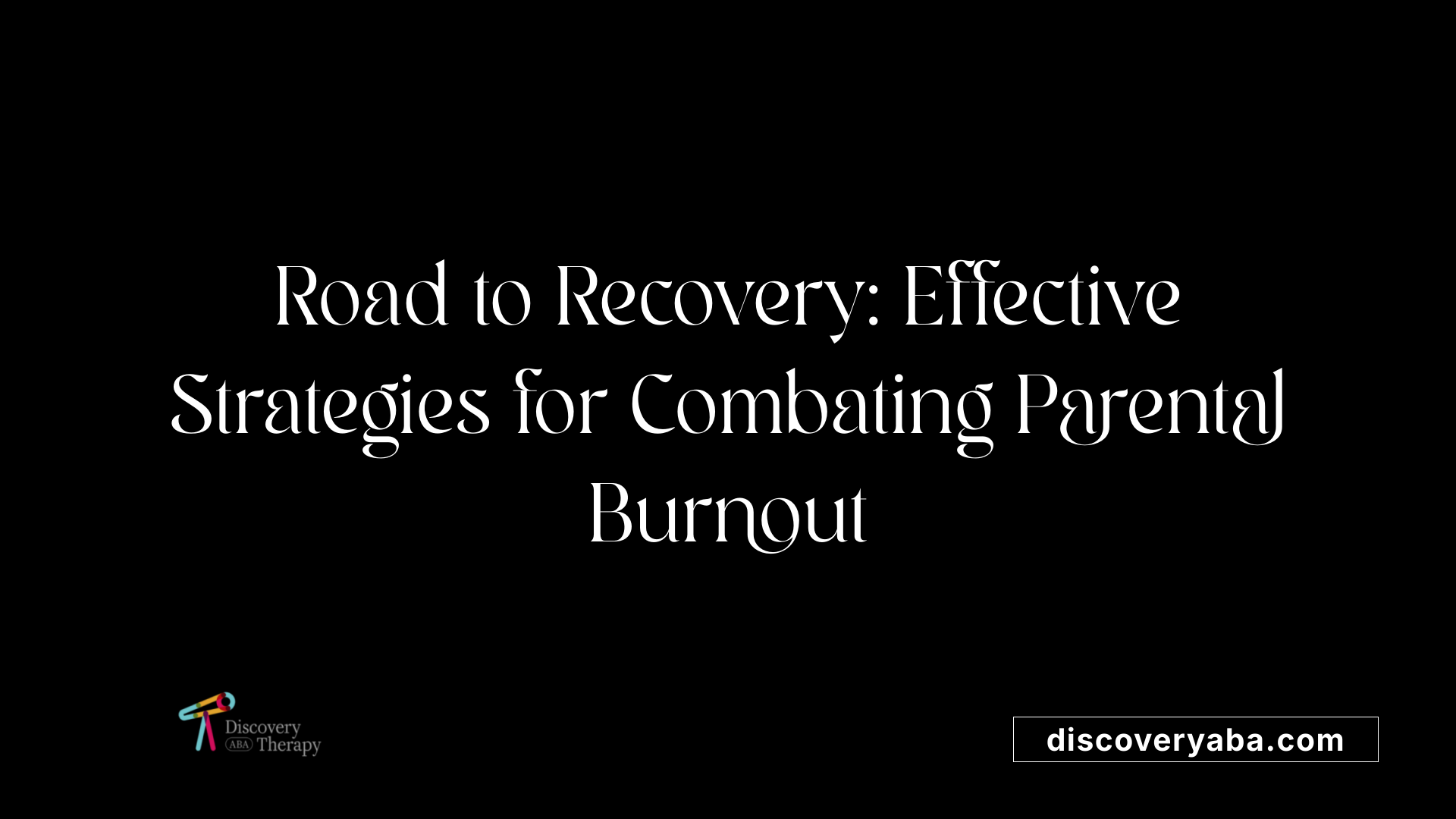
How can parents recover from parental burnout?
Recovering from parental burnout begins with recognizing key symptoms like emotional exhaustion and a sense of distance from one’s children. Awareness is the first step toward recovery. Equally important is the practice of self-care. Engaging in mindfulness practices, ensuring proper nutrition, and getting adequate sleep are foundational elements that can revitalize both mental and physical health.
Building a support system is crucial. Parents should involve friends, family, or even local support groups to create a safety net that alleviates isolation. This emotional support can be invaluable during challenging periods. Open communication about struggles not only fosters understanding but also encourages shared responsibilities within the family.
Finally, addressing stressors is essential. Parents should take a hard look at their expectations—letting go of perfectionist ideals can significantly ease the pressure they feel. Stressors can often transform into manageable tasks when re-evaluated as growth opportunities. Seeking professional help from counselors or therapists may further equip parents with effective coping strategies.
Here’s a quick summary of potential strategies:
| Strategy | Description | Benefits |
|---|---|---|
| Self-Care | Engage in mindfulness, nutrition, and exercise | Restores mental and physical health |
| Support System | Involve friends, family, and support groups | Reduces feelings of isolation |
| Open Discussions | Share struggles within the family | Strengthens familial bonds |
| Reassessing Expectations | Let go of perfectionist ideals and reframe stressors | Decreases pressure and stress |
| Professional Help | Seek counseling for expert coping strategies | Provides tailored support and advice |
Preventing Parental Burnout: Proactive Approaches
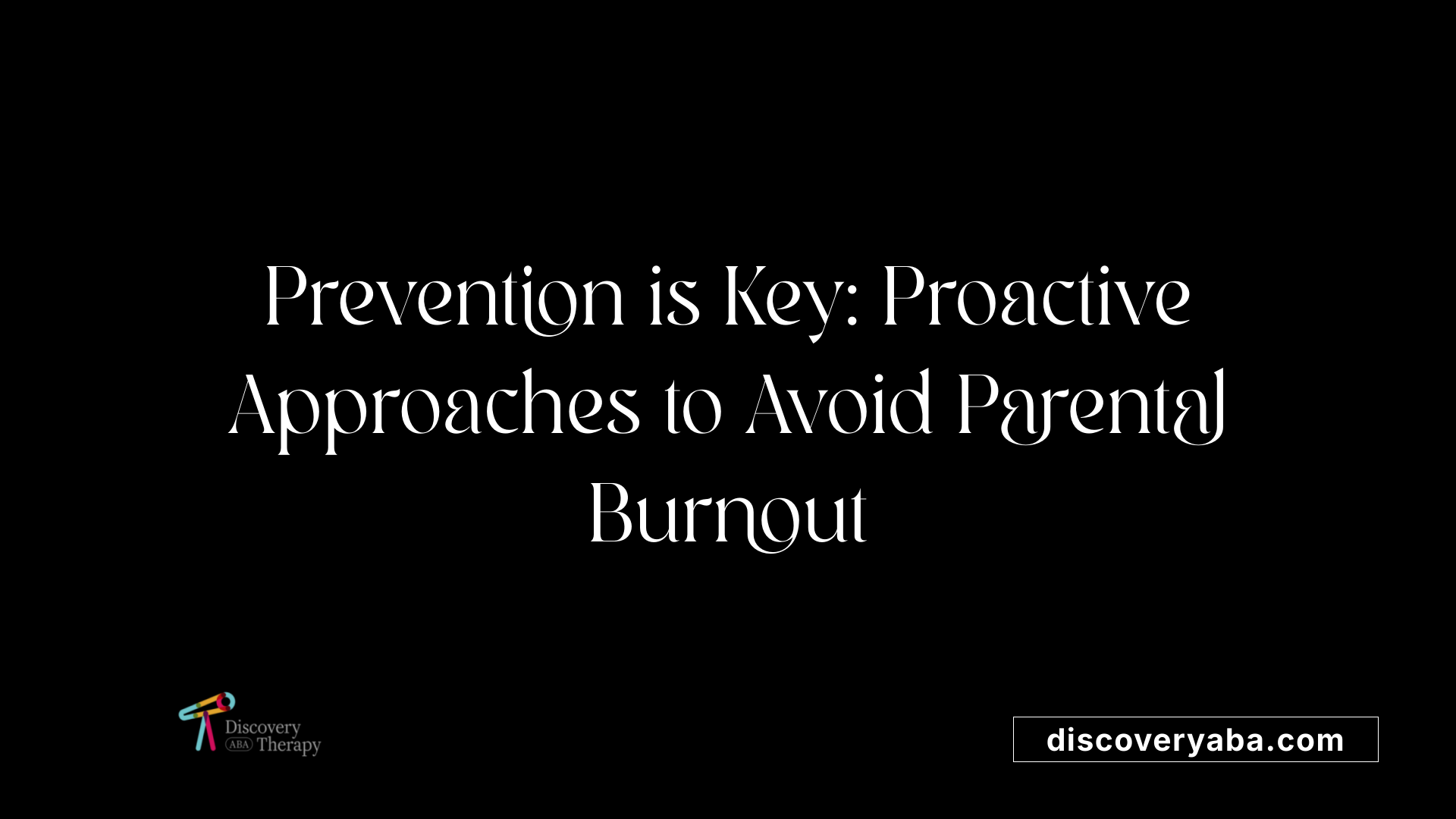
How can parental burnout be avoided?
Preventing parental burnout requires a proactive approach that balances self-care with parenting responsibilities. One effective way is to adopt the 'STOP' technique: Stop, Take a breath, Observe your feelings, and Proceed. This mindfulness practice helps parents to become aware of their stressors and respond mindfully.
Creating realistic expectations is essential. Parents should recognize that perfection is unattainable and that small victories matter. By setting achievable goals and acknowledging progress, parents can mitigate feelings of inadequacy and frustration.
Building Community Support
Building a supportive community can play a significant role in alleviating feelings of isolation. Parents are encouraged to engage in open discussions about their experiences with trusted friends or family members. This openness can normalize feelings of burnout and lead to valuable support networks.
Joining parent support groups or engaging in therapy can bolster resilience. Sharing struggles with others who understand similar challenges can provide both emotional relief and practical advice.
Reframing Self-Care
Reframing self-care as a necessity, rather than a luxury, is crucial. Parents should prioritize downtime, even if it's just a few minutes a day for a hobby or mindfulness exercise. Recognizing that self-care strengthens their capability to care for their children helps reduce the stigma often associated with seeking support.
In summary, balancing self-care with realistic expectations and seeking community support are vital strategies for preventing parental burnout.
Implementing ABA Therapy at Home for Parents
Can ABA therapy be done at home by parents?
Yes, ABA therapy can be effectively implemented at home by parents. Behavior specialists often encourage this approach, as incorporating ABA techniques into daily routines helps reinforce skills and promotes desired behaviors.
Benefits of parental involvement in ABA
- Enhanced Skill Reinforcement: Daily practice of ABA strategies allows parents to reinforce learning in a familiar setting for the child.
- Strengthened Parent-Child Bond: Engaging in therapeutic activities together can strengthen relationships and trust, making it easier for children to learn.
- Increased Progress: Active participation by parents can lead to faster progress, as frequent practice combines professional insights with personalized family dynamics.
Practical ABA techniques parents can use
- Shaping: Gradually reinforcing successive approximations of a target behavior makes learning manageable and achievable.
- Prompting: Using verbal or physical cues to encourage desired behavior helps children learn new skills more effectively.
- Token Economies: Implementing a system where children earn tokens for positive behaviors can motivate them to engage in and practice desired actions.
Guidance from professionals
Working with a qualified behavior analyst can greatly enhance the effectiveness of home-based ABA therapy. They can provide tailored strategies, support in monitoring progress, and adjust techniques to suit individual child needs. Consistent training and feedback from professionals ensure that parents feel confident in their approach and maximize the benefits for their child.
Managing Parenting Burnout with Mental Health Challenges
What are effective strategies for managing parenting burnout while supporting a child with mental health challenges?
Addressing parenting burnout, especially when caring for a child with mental health challenges, is vital for both the caregiver and the child. Here are several strategies that can help manage burnout effectively:
1. Prioritize Self-Care
Engaging in regular self-care activities such as exercising, maintaining a balanced diet, and ensuring adequate sleep can significantly bolster a parent's mental health. These practices help replenish physical and emotional reserves, enabling caregivers to better handle challenges.
2. Build a Support Network
Creating connections with others, be it through caregiver support groups, friends, or family, can alleviate feelings of isolation. These support networks offer emotional relief, shared experiences, and practical advice.
3. Recognize the Signs of Burnout
It's crucial to be aware of burnout symptoms, including fatigue, irritability, withdrawal from social interactions, and changes in sleep patterns. Early recognition allows for timely intervention and management.
4. Implement Stress Management Techniques
Managing stress effectively—such as practicing mindfulness, setting boundaries, and taking regular breaks—can help maintain a healthier balance. Viewing challenges more as growth opportunities can transform one’s perspective, reducing anxiety associated with parenting.
5. Set Realistic Expectations
Establishing achievable goals for both the caregiver and the child’s development helps reduce pressure. This includes recognizing that perfection in parenting is unattainable and allowing time for self-reflection and downtime.
By integrating these strategies, parents can foster resilience, alleviate burnout, and enhance their ability to provide compassionate care to their children.
Balancing Parenting and Self-Care
What strategies help balance parenting responsibilities with self-care?
Balancing parenting responsibilities with self-care is essential for maintaining well-being and fostering positive family dynamics. Here are some strategies that can help:
Time Management Strategies
Using tools like calendars or planners allows parents to visualize their commitments. Prioritizing tasks and scheduling specific blocks of time for self-care can create necessary space for personal rejuvenation. Setting aside just a few moments daily for activities such as mindfulness or reading can significantly ease stress.Self-Care Activities and Support Systems
Engaging in self-care activities—like exercise, mindfulness practices, or pursuing hobbies—can help recharge emotional batteries. Connecting with support systems, such as family, close friends, or parenting groups, allows parents to share experiences and feelings, reinforcing social connections and reducing isolation.
Adding small, enjoyable activities into daily routines can enhance mental health, making it easier to cope with parenting challenges.Setting Boundaries and Open Communication
Clearly articulating personal needs to family members fosters understanding and support. Establishing boundaries is crucial to carving out time for self-care; saying no to additional responsibilities and avoiding taking on too much can help maintain this balance. Open discussions about self-care and family needs encourage teamwork within the home, ultimately leading to a more harmonious environment.
These strategies are vital for creating a sustainable parenting experience while ensuring parents also attend to their own emotional and mental health.
Emotional Toll and Support for Caregivers
What insights are there on the emotional toll of caregiving?
Caregiving can evoke significant emotional challenges, manifesting as chronic stress and diminished psychological well-being. Parents, especially those caring for children with special needs like Autism Spectrum Disorder (ASD), often report elevated levels of anxiety and depression.
Factors contributing to this emotional strain include juggling multiple responsibilities, such as managing a full-time job alongside caregiving duties. Caregivers frequently describe feelings of being overwhelmed, isolated, and burdened.
Chronic exposure to such stressors can lead to symptoms of parental burnout, including emotional distancing from children and physical manifestations like fatigue and headaches. It is essential for caregivers to recognize these emotions as valid and treatable.
Why is mental health support important?
Mental health support plays a crucial role in helping caregivers navigate these emotional trials. Counseling and professional support can provide strategies to manage stress, improve coping mechanisms, and foster emotional resilience.
Additionally, engaging in practices like mindfulness and establishing realistic expectations can significantly uplift caregivers' mental health. By prioritizing their well-being, caregivers enhance their capacity to support their children effectively.
What is the role of support groups in caregiving?
Support groups emerge as an invaluable resource for caregivers. They offer a safe space for parents to vocalize their worries and share experiences, which can normalize feelings of burnout and reduce shame associated with seeking help.
Additionally, these groups foster connections that alleviate isolation, allowing caregivers to cultivate a support network. By exchanging stress management strategies and emotional support, caregivers can cultivate resilience, making their journey more manageable.
In essence, while the emotional toll of caregiving can be heavy, mental health support and community connections can profoundly mitigate its effects.
Creating a Supportive Home Environment for ABA Therapy
What techniques can sustain a supportive environment at home for children undergoing ABA therapy?
To create an effective and supportive atmosphere for children undergoing Applied Behavior Analysis (ABA) therapy, several techniques can be implemented.
Consistency in Routines
Establishing a consistent daily routine is crucial. Children thrive in structured environments where expectations are clear. Regular schedules reduce anxiety and improve focus, which is beneficial for skill acquisition. Parents should designate specific times for therapy exercises, ensuring these activities become a natural part of the child’s day.
Family Involvement
Involving all family members in the therapy process reinforces learning. When siblings and other relatives understand therapy goals, they can help practice skills in a supportive manner. Collaborative family engagement helps create a cohesive support network, making it easier for the child to apply learned behaviors in various settings.
Reinforcement and ABA Techniques
Positive reinforcement is vital in ABA strategies. Celebrating milestones, no matter how small, encourages children to engage in desired behaviors. Employing ABA techniques throughout daily activities can turn routine moments into learning opportunities. For example, if a child successfully completes a chore independently, praising them strengthens the behavior.
Maintaining Open Communication
Parents should maintain regular communication with therapists to adjust strategies based on their child's progress. This collaboration ensures that interventions are tailored effectively.
Prioritizing Self-Care
Lastly, prioritizing self-care for parents significantly impacts their ability to support their child. Taking time to recharge enhances patience, persistence, and overall effectiveness in parenting. When parents model self-care and emotional resilience, they contribute to a nurturing environment that fosters growth and improvement in therapy.
Resources for Improving Parenting Skills Amidst Burnout
Seminars and training
Participating in parenting seminars and training can provide valuable insights and strategies to effectively manage the challenges of raising children, especially those with special needs. These programs often cover essential skills that help boost confidence and effectiveness in parenting. Caregivers can learn evidence-based practices tailored to various situations, which can be particularly beneficial in reducing stress and improving resilience.
Evolving parenting techniques
Staying updated with the latest parenting techniques is crucial in navigating the complexities of caregiving. Resources like workshops and online courses offer parents the opportunity to adapt their approaches based on new research and methodologies. This evolution in techniques not only enhances parenting strategies but also fosters a positive environment that can alleviate feelings of burnout.
Building confidence through learning
Investing time in learning about effective parenting can significantly enhance parents' confidence levels. Knowing more about child development, behavioral management, and communication skills empowers parents to handle everyday challenges better. As parents become more equipped with knowledge, their feelings of helplessness diminish, providing a buffer against the exhaustion of caregiving.
To summarize, engaging in continuous education through seminars, embracing new parenting techniques, and building confidence can create a more supportive and effective parenting experience, ultimately helping to combat burnout.
| Resource Type | Description | Benefit |
|---------------------|------------------------------------------------|----------------------------------------------|
| Seminars | Programs focusing on parenting skills | Provides practical strategies to cope|
| Online Courses | Flexible learning on various topics | Enhances knowledge and adaptability |
| Workshops | Interactive sessions for experiential learning | Boosts confidence and builds community support|
| Support Groups | Networking with fellow parents|
| Offers emotional support and shared experiences|
Conclusion: Prioritizing Wellness to Support Effective Parenting
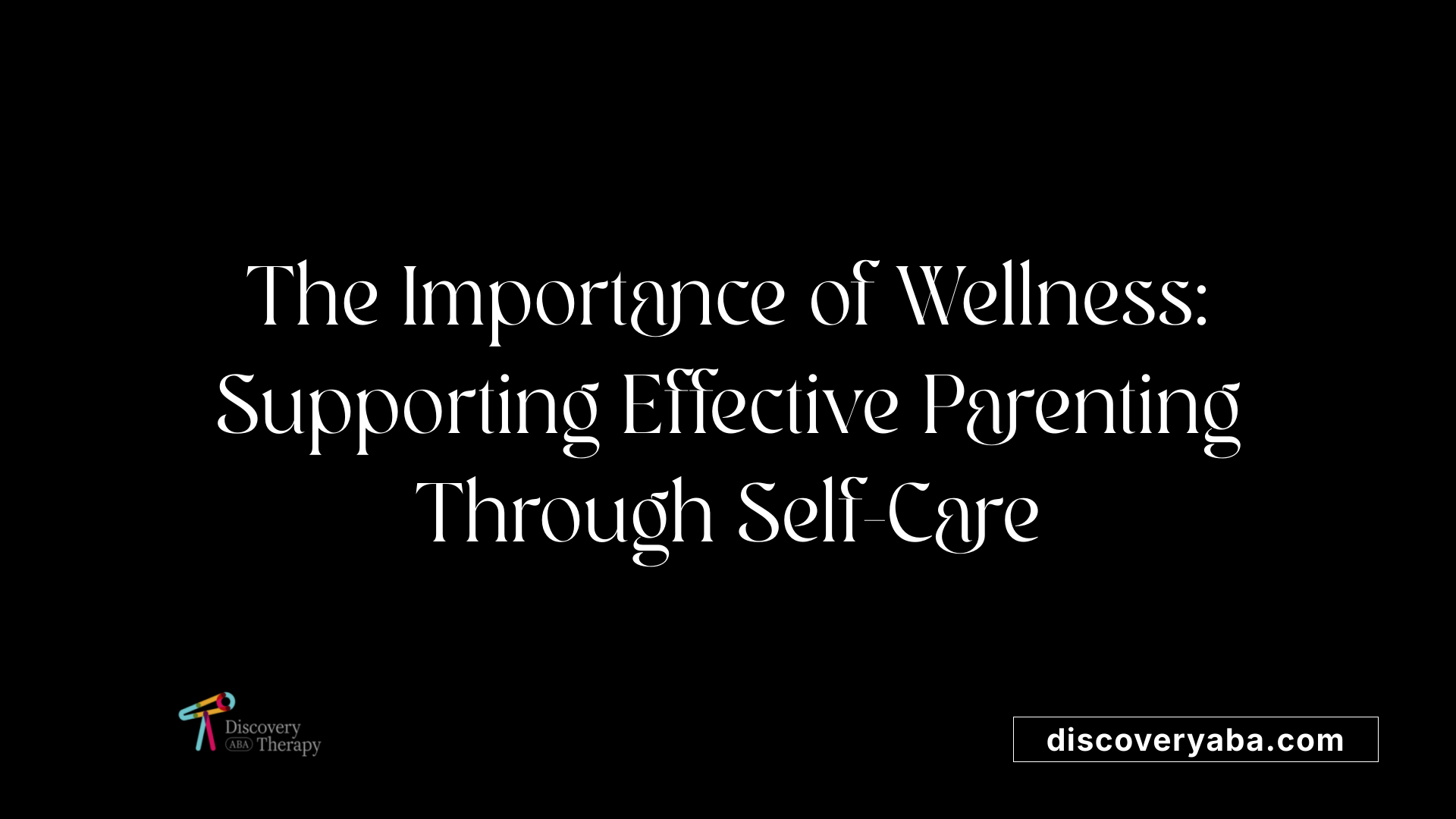
What is Parental Burnout?
Parental burnout is a complex state characterized by physical, emotional, and mental exhaustion resulting from long-term care demands, particularly when parents care for children with special needs or challenging behaviors. Parents may experience symptoms like emotional detachment, fatigue, and a decline in personal fulfillment.
How to Identify Symptoms of Burnout?
Common signs of parental burnout include:
- Emotional Exhaustion: Feeling drained and overwhelmed by parental responsibilities.
- Detachment: A sense of distance from children, leading to less engagement in parenting.
- Physical Symptoms: Headaches and fatigue resulting from incomplete self-care.
What Role Does Self-Care Play?
Self-care is fundamental for managing burnout. Engaging in activities that bring joy and relaxation can help recharge emotional and physical batteries. Prioritizing sleep, exercise, nutrition, and mindfulness fosters resilience, enabling parents to handle challenges more effectively.
Why is Open Communication Important?
Talking about feelings of burnout is vital for normalizing the experience. Seeking support from friends, family, and professional networks provides validation and practical solutions. Building a community of support alongside communicating openly about struggles can diminish isolation, alleviating the burden of parental stress.
How Can Parents Create Sustainable Strategies?
Sustainable approaches incorporate numerous strategies:
- Setting Realistic Goals: Acknowledging limits helps mitigate feelings of inadequacy.
- Establishing Routines: Creating predictable schedules can ease daily stressors.
- Utilizing Respite Care: Taking breaks is essential for maintaining mental health and vitality.
Supporting Children’s Needs Effectively
Ultimately, prioritizing self-care not only aids parents in managing their own stress but also enhances their ability to engage positively with their children. This dual benefit strengthens both parental well-being and child development, laying the groundwork for healthier family dynamics.
Prioritizing Wellness for Sustainable Parenting and Effective ABA Support
Ultimately, managing parental burnout while supporting ABA therapy at home involves a delicate balance of self-care, community support, and active involvement in the therapeutic process. By recognizing and addressing burnout, implementing consistent supportive strategies, and prioritizing their own well-being, parents can foster a nurturing environment that benefits both them and their child. As caregivers navigate the challenges of ABA therapy and parenting, maintaining open communication and setting realistic expectations are key elements to achieving long-term wellness and effective child development.
References
- The impact of parental burnout - American Psychological Association
- Caregiver Burnout: 5 Ways Parents Can Prevent Exhaustion
- Managing Burnout While Caring for an Autistic Child
- Preventing Parent Burnout - Child Mind Institute
- Parent Self-Care for Autism : Managing Stress and Burnout
- Essential Strategies for Parents of Children with Autism
- A systematic review of parental burnout and related factors among ...
- Navigating Burnout: Self-Care Strategies for ABA Therapists
Find More Articles
Contact us
North Carolina, Tennessee, Nevada, New Jersey, Utah, Virginia
New Hampshire, Maine
Massachusetts, Indiana, Arizona, Georgia
.avif)













































































%2520(1).jpeg)

















